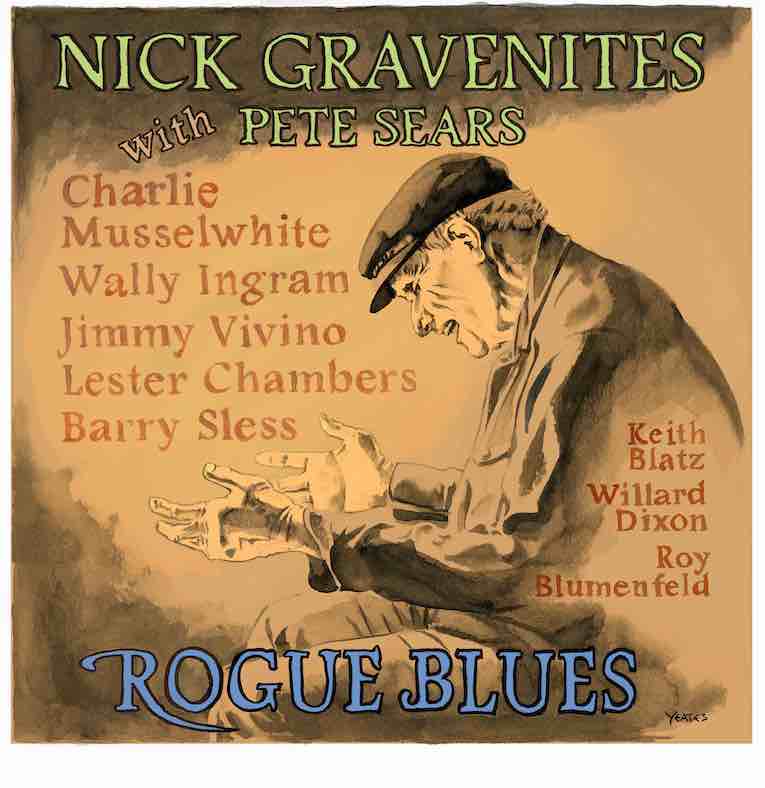
Review: Nick Gravenites ‘Rogue Blues’
By Jim Hynes
The distinctive voice of the Butterfield Blues Band and the Electric Flag, Nick Gravenites, returns with a solo album, Rogue Blues, his first in eight years. These are songs that Gravenites liked to play live, and many have never been released. The title was chosen by Gravenites, a longtime independent artist catering to the whims of no one. There are infamous tales of his shouting matches with rock promoter Bill Graham, for example. Yet, he has long been admired by his peers for this independent streak, his sense of humor, and his loyalty. Now 85, he is no longer able to play the guitar due to severe arthritis in his hands, but his signature vocals and innate songwriting sense remain intact.
Regarding the latter, Gravenites wrote the Paul Butterfield Blues Band classic, “Born in Chicago” which was inducted into the Blues Hall of Fame in 2006 and into the Rock n Roll Hall of Fame in 2015. His “Buried Alive in the Blues” appeared as an instrumental on Janis Joplin’s Pearl. He was a pivotal figure in both blues and rock n roll in the late ‘60s and ‘70s having written songs for Pure Prairie League, Tracy Nelson, Roy Buchanan, and bluesmen Howlin’ Wolf, Otis Rush, and James Cotton.
As a real jog to the memories of those who grew up in that period, Gravenites was the producer of Brewer and Shipley’s “One Toke Over the Line.” (Who remembers that one?) Gravenites also had ties to Quicksilver Messenger Service and Big Brother & the Holding Company, post Joplin as he has long resided in northern California, part of the Chicago migration that included his co-founder of the Electric Flag, Mike Bloomfield; and Charlie Musselwhite.
This project was largely helmed by Pete Sears (who also played piano, accordion, and bass) and co-produced by Thomas Yeates. Musicians include Gravenites’ long-time friend Charlie Musselwhite (harmonica), Jimmy Vivino (guitar, mandolin), Barry Sless (pedal steel, rhythm guitar), Wally Ingram (drums) and Lester Chambers (harmonica) of The Chamber Brothers. Keith Blatz (sousaphone), Willard Dixon (clarinet) and Roy Blumenfeld (drums) also appear. Notably, four tracks were recorded in July of 2023 with the other three in 2022. So, this is all new material, not dusted off older recordings.
You may be surprised that Gravenites begins with “Poor Boy,” penned by Howlin’ Wolf in 1958 but Chess had asked Gravenites to write two additional verses to the song for the 1970 Howlin’ Wolf London Sessions, which he sings here. Immediately one gets a sense for Gravenites weathered vocals and the kind of phrasing only the sage wise veterans possess, backed by Sears, Ingram, and Musselwhite’s trademark blues harp. He then hails those same blues singers that he grew up with in the Chicago scene, namely Muddy Waters and Howlin’ Wolf, in his storytelling style on “Blues Singers.” The track may come off as mostly homage but there’s an inherent sly grinning confidence seeping through it as if to say “count me among your ranks.”
The standout ballad “Left Hand Soul,” might well be his strongest vocal of these seven, backed simply by Sears’ piano and Chambers on harp as Gravenites reminisces about his time in Chicago and the many desperate characters in Cook County Jail and on the streets. “Blackberry Jam” goes straight back to 1955 with compatibly vintage instrumentation that includes clarinet and sousaphone.
Sears and Vivino join Gravenites on the choruses for the swaying, insistent piano driven “Blues Back Off Of Me,” with Musselwhite and Vivino stepping forward in the breaks. “Brown Paper Bag” also recalls those early days in Chicago, with Sears on accordion and Vivino on mandolin, giving it the retro sound as Gravenites riffs the lyrics rather improvisationally. With yet another coloring, Barry Sless plays the pedal steel giving “What Time It Is” a slightly country feel in the closer.
Hopefully this recording serves as a reminder of the important role that the oft overlooked Gravenites played in the groundbreaking Chicago blues sound and the rock n roll bands of the early 70s. He’s still at it, with those remarkable vocal chops resonating through these seven tracks. As Maria Muldaur says in the liners, “Any lovers of the Real Deal Old School Blues are sure to appreciate this recording!” Sadly, his kind doesn’t come along anymore, making it that much more important that we treasure this offering.
Listen to “Poor Boy” Here.
Pre-save the album Here

Thanks, Martine and Jim for the very thoughtful review!
Ahhh…. should have checked the link to pre-save the album! That’s the link to listen to the tune. The links are reversed. Cheers.